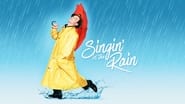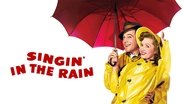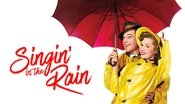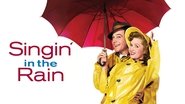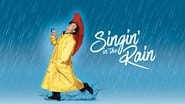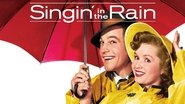GamerTab
That was an excellent one.
Wordiezett
So much average
Siflutter
It's easily one of the freshest, sharpest and most enjoyable films of this year.
Kien Navarro
Exactly the movie you think it is, but not the movie you want it to be.
julibufa
Scene begins. After all the first hour we've just seen we are in love with this film already but we're waiting for something to finish the movie, and we don't know what we're about to see.Nevermind, scene begins. Fade into a microphone, Debbie Reyonlds sings 'Would You' in a beautiful manner with an orchestra behind her. Don is looking at her in love. We see Lina in another shot thinking she's recording her part and it's really funny. We cut to the studio with the music still going and Don and Lina dance and lip-sync to the song. When the camera closes-up to Lina and we think the movie can't get more wonderful until she turns into B&W and now the scene is in a little theatre where Don, Cosmo and R.F. watch the end result. This beautiful sequence has some wonderful transitions. But we've seen nothing yet. R.F., Cosmo and Don are talking about the movie. Apparently there's still a scene and a number to shot: 'The Broadway Melody'. What is 'The Broadway Melody'? Well, Gene Kelly is nice enough to show us. 'First we set the stage with a song...' The camera pans out and fades to black. Now we are in another universe. We're in Gene Kelly's mind at this point.Scene continues. Gene Kelly starts singing a couple of verses of a song about Broadway and how beautiful it is. He sings on a yellow carpet located in the middle of the dark. When the camera pans out we see a perfect little circle of light in the end, but when Gene Kelly stops singing, all the lights go bright, and we see 'Casino' behind him, and kind of like in Broadway we feel overwhelmed with that much stimulus. And when everything goes to color and the floor is now blue, the entire Broadway Ballet (for real) enters the shot. Lots of people with suits and dresses of different colors with their hands up. And before all of them turn, everything changes.Scene continues. Now Gene is walking down the streets of Broadway. Everyone is walking fast. He wears a silly suit, hat, glasses and suitcase. He walks in a moving carpet that shows him all the different personalities that there are. In a ridiculously organized sequence, he sees more colors than possible and finally after all the dancing and jumping, a man gives Kelly directions to where he needs to go.Scene continues. He goes into Theatrical Agencies. He walks down the hall to the music and knocks on a door and when the man opens, he screams 'GOTTA DANCE!' and dances a couple of seconds. The man shots the door on his face. So he goes to another agent door and knocks. He opens. 'GOTTA DANCE!'. He dances. Door shots in his face. Walks down the hall again and by the third time the man accepts and gives him a different look.Scene continues. The agent takes him to an underground party with a lot of people dressed in colors. Know the color of the place went from blue to red. When nothing could be better, the agent calls the attention of all the dancers and says to Gene 'GOTTA DANCE!', and the dancers sing 'GOTTA DANCE!' and Gene responds 'GOTTA DANCE!'. And so they dance. Everybody smoothly follows Gene's choreography. Everybody dances to the Broadway Melody.Scene continues. The music hasn't stop one second by this moment. Everybody leaves the dance floor for Gene to make a beautiful dance number alone, enjoying his triumph. He also proves he can jump like a classical dancer, showing his abilities as a performer. He's not just a roaring twenties disposable tap dancer, he's a true believer in quality. Who could dance better than him?Scene continues and Gene stops dancing when he falls to the ground and finds himself in front of the legs of a tall woman in a green dress. It's Cyd Charisse, the one and only, one of the best dancers of all time. She looks at Gene like 'I can beat him', so she steals his hat and goes to the dance floor. A scarred man throws a coin around that represents his power.Scene continues. Gene is stunned by her unmistakable legs moving to the music that is now slower and sexier. The lights are a little out and she takes him for a prisoner in her sensual skills. He is speechless. And when she has stolen his show, his glasses and his hat to humiliate him, puts a cigarette on his mouth. He can't take it, so he throws it away, grabs her violently by her hand and throws her to himself. Now he is dancing her, unlike before, that she was dancing him. After he dances her around, she starts putting a face that shows that now she's attracted to him, he's not like everyone else, he has initiative and he CAN dance. Cyd Charisse is now been out-danced by Gene Kelly and she's letting him, falling in lust with him as he is with her. Their about to kiss and when everything seems to be working, the scarred man approaches the dance floor walking, tossing his coin around. She sees his silver watch and she starts following him. He can't dance, but he has money and power, so he wins. Gene tries to go back to her but the bodyguards of the scarred man stop him, and they toss around their coins, because they're just like him. They're evil and have no personality. She will never be happy with them.Scene continues though. After this everyone goes back to the dance floor because the party still goes on. The agent grabs him by the arm and knowing his capabilities takes him to the stage zone. Now he just has to start succeeding. First off he starts in a silly theatre where he dances kind of annoyingly to the lyrics 'when I hear that happy beat, feel like dancing down the street', using it as a leit motiv for the previous part. He then ascends to a more serious place where he dances the same tune but with a different outfit, he and his dancers. Finally he goes to the most prestigious place where he now dances like a true gentleman. He has succeeded. It's the same shot, the same song, the same dance, but every time a little more classy.Scene continues. He's at a party now, dances with some of the women for a couple of seconds. Everybody is happy to see him and everybody recognizes him. Has everything he's ever wanted. He's about to make a toast with the rest of the people, when time freezes because a woman enters the salon. Is Cyd Charisse. Now she's not wearing that sexy green dress from before, but now she's wearing a beautiful white dress that shows just how beautiful she can naturally be. It's a curse. He was over her, he was successful and happy and now she appears to remind him just how miserable he is with a woman by his side. This is the second time he sees her in his life, but he has to get her or otherwise it will be the last.Scene continues. Everybody in the party disappears except for Gene and Cyd. They are alone know, in an infinite paradise for the two. Now Charisse has a beautiful long veil that represents her greatness, and she's ready for one last dance. They approach themselves until they are close. They dance like nothing before, their union is represented by how they move around in the infinite, making movements from here to there, until they touch together and the veil starts uniting them, making the role of the veil all the more significant. In three minutes and just three shots we see them beautifully owing the world. They finally kiss. They are alone in the universe and know this dance is not sexual anymore, this is LOVE. True love. And near the end they incredibly go back to the exact same positions that they were before, him waiting for her and she showing her long vale, making everything else not matter.Scene continues. Everyone appears again, the party goes on. We have seen the power of dance in a beautiful way. Everyone drinks for the toast and now Gene Kelly approaches her in real life, because that part was all in his head. And when he happily goes to her, she doesn't care and just starts tossing a coin around. Finally she throws the coin at him very smoothly and he catches it. She goes with the scarred man. A maid approaches Gene to give him his stick and hat back, because he's about to leave. And for a tip, he gives her the coin. But he doesn't throw the coin at her, he puts it in her hand, showing that he's different, he's not evil like that woman or the scarred man or all the greedy men in the world, he's just a man in love, a man with a heart broken. She thanks him and goes away. He goes away too.But scene continues. A door opens in the middle of the dark, is the yellow carpet from the start. We read 'Casino' above. A shadow comes walking towards us and when the camera fully makes a close-up to Kelly's face a voice is heard: 'GOTTA DANCE!'. It's a young man, with the same clothes Gene was wearing at the beginning. He starts dancing and goes away to Broadway to pursue his dream of becoming a star. Gene realizes then that that wasn't important. What really makes him happy is dancing. So he does. He scream 'GOTTA DANCE' and the Broadway Ballet enters the shot like in the beginning. We see them dance joyfully and freely together. The colors and the smiles make one little happy beautiful world. Because what really matters is doing what you like, and not waiting for a greedy woman that will never come again. And what better than watching Gene Kelly dancing his troubles away? It's beautiful. The most beautiful sequence in the entire history. It doesn't have anything to do with the story of the film and it's never mentioned again. Cyd Charisse never appears before and never appears again. It shows what cinema couldn't do in the '30s with 'The Broadway Melody' films. It's just an excuse to see the most beautiful musical ever made, and that's sincerely an honest take on what the filmmaker wants to do and the watcher wants to see. Pure cinema for fun.Scene continues. As he comes dancing towards the camera everybody is spinning and this whole adventure finishes with everybody standing with their hands up as Gene Kelly approaches the camera to a close-up-zoom-out, making him a giant in a rainbow of creativity and everybody sings 'That's the broadway melody'.End of scene.
pkiasar
A good family movie with good poems for kids to sing.
m_mehdi_m62
Singin' in the Rain is the best musical movie ever seen. Love, hate, laughter and cry are emotional elements planed professionally within the movie. Lighting, coloring, voice effects, and color mixture are amazing. There is too much spirit it this movie and it is nicely articulated within face, dance, movement and voice of actors and actresses.
JohnHowardReid
Copyright 11 March 1952 (in notice: 1951) by Loew's Inc. A Metro- Goldwyn-Mayer picture. New York opening at the Radio City Music Hall: 27 March 1952. U.S. release: 10 April 1952. U.K. release: May 1952. Australian release: 27 June 1952. 102 minutes.SYNOPSIS: At the advent of talkies a popular silent screen team is hamstrung by the fact that the female partner has a voice like a berserk chipmunk.NOTES: Would you believe that Singin' in the Rain — the most popular, the most critically acclaimed musical of all time — did not receive any prestigious Hollywood awards. In fact the film had only two nominations, the first for Jean Hagen as Supporting Actress (she was passed over by Academy members in favor of Gloria Grahame in The Bad and the Beautiful), and the second for Scoring of a Musical Picture in which category Lennie Hayton lost out to Alfred Newman's With a Song in My Heart.The film didn't fare any better with contemporary critics. Although it placed in number three position (after The Atomic City and My Six Convicts) on his supplementary Hollywood movies list, it didn't make Bosley Crowther's Top Ten Pictures of 1952 for The New York Times. At least the film came in at the number eight spot both on The National Board of Review's Best American Films of the year and the annual Film Daily poll of the nation's film critics.MGM production number: 1546. Shooting from 18 June 1951 through to 21 November 1951, plus one day, 26 December 1951. Rehearsals started on 12 April 1951. Ernie Flatt worked with Debbie Reynolds on her tap dancing, while Kelly, Donen and Haney started on the staging of the numbers.Kelly explains that the two directors, whilst always working in close collaboration, sometimes worked individually as well as in tandem. Two sound stages were often used simultaneously, with photographer Rosson rushing from one set to the other. Kelly says he concentrated on directing the musical numbers, whilst Donen usually handled the straight story material.Two numbers were deleted before the first preview in order to speed up the story: "You Are My Lucky Star" sung by Betty Royce whilst Debbie Reynolds gazes at a billboard of Kelly; and Kelly singing and dancing "All I Do Is Dream of You".Negative cost: $2,540,800 (which was over budget by $620,996 mostly because the "Broadway Ballet" which had been estimated at only $80,000 was considerably extended when Donald O'Connor was unable to participate in the number due to a prior television commitment and a new story was built around substitute star Cyd Charisse). Initial domestic rentals gross: $7,665,000 which made it number ten on the nation's list of Box office Champions for 1952. Interestingly, it was by no means MGM's top grosser of the year, its takings exceeded by both Quo Vadis (shown at roadshow admission prices) and of course Ivanhoe which sold more tickets than any other movie of that year.COMMENT: Why is Singin' in the Rain the greatest of all screen musicals? A perfect marriage of story and songs, for one thing. The story's fresh, vital, witty, sharp amusing, charming, pointed, satirical with interestingly likable characters pacing from one fascinating crisis to another with agreeable fortitude. The songs flow naturally from and are an integral part of the story-line. Moreover these songs themselves are fresh, vital, witty, sharp, amusing, charming, pointed and satirical.Add to perfect story and perfect song, a perfect cast. Kelly is more debonair here and has lost most of that unattractive brashness and even boorishness of the screen persona he created in his earlier films. O'Connor too has toned himself down, only really letting loose in the musical numbers which make a nice contrast to his more unassuming role in the straight sequences. Miss Reynolds is perky, energetic, self-confident yet identifiable girl-next-door. Jean Hagen of course has the best role of her career and gives the performance for which she'll always be remembered.Add to perfect story and perfect songs and perfect cast, perfect direction. Kelly and Donen move their camera fluidly yet unobtrusively through both complex dance steps and constantly entertaining, twisting plot situations. Supporting technical credits are likewise as highly accomplished as they come.One of the things I most like about Singin' the Rain is that it's so consistently entertaining. There are no dull patches at all. True there are highlights, but the pace is so fast, and one highlight follows so quickly on the heels of another, and there are so many, it seems invidious to single three or four out in preference to seven or eight others.I suppose On the Town should have forewarned us, but the super- stylish, super-energetic, super-witty Singin' in the Rain is anything but the sort of stodgy, second-hand musical we expect from MGM. It's nice to have wit plus MGM's super production values as well.POSTSCRIPT: In the picture's credit titles, Freed's song is quoted as providing the script's inspiration. This of course is malarkey. The credit is nothing but a sop to producer's Freed's ego. When initially preparing the script, Comden and Green used their own imagination and initiative. And of course, as we now all know, Kelly actually hated the brash, egotistic O'Connor and conspired with Donen to fabricate various shooting delays so that O'Connor was unable to participate in the movie's rousing finale due to his previous TV commitment.














